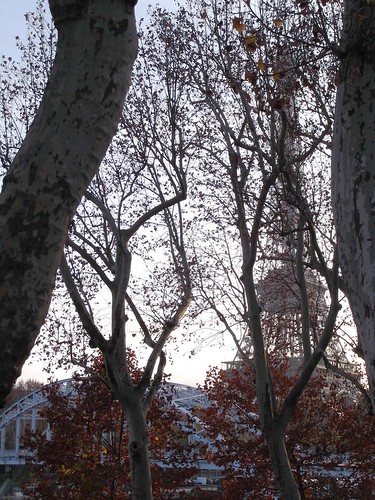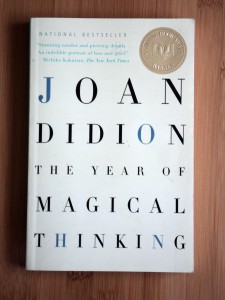To move from a contemporary novel to a book by Henry James is like leaving a meadow and stepping into an ancient bamboo grove where the surroundings are undoubtedly exquisite, but the trees are packed together, and if you’re careless, you’ll quickly lose your way.
Henry James’ The Ambassadors (1903) is stocked with gems worthy of close inspection. James recommended readers stop at five pages a day, so they could adequately absorb his ambition. To be fair, the book is guilty of what critic Edmund Wilson identified as James’ tendency for only “one vocabulary and one cadence for the whole cast of moods and characters.” But what a singular cadence it is!—it’s enough to make an ordinary writer bleed with envy.

 photo credit: couscouschocolat
photo credit: couscouschocolat
Lambert Strether, a conservative New Englander, is sent by his fiancée to Paris to bring home her son Chad Newsome, who they fear is with a less-than-virtuous lady. While staying in Paris, Strether undergoes an awakening, and glimpses a life he might have lived while young. He ultimately counsels Newsome to remain in Paris, and urges him not to let “the moment” get away:
“Live all you can; it’s a mistake not to. It doesn’t so much matter what you do in particular, so long as you have your life. If you haven’t had that what HAVE you had?…What one loses one loses; make no mistake about that. The affair—I mean the affair of life—couldn’t, no doubt, have been different for me; for it’s at the best a tin mould, either fluted and embossed, with ornamental excrescences, or else smooth and dreadfully plain, into which, a helpless jelly, one’s consciousness is poured—so that one ‘takes’ the form as the great cook says, and is more or less compactly held by it: one lives in fine as one can. Still, one has the illusion of freedom; therefore don’t be, like me, without the memory of that illusion. I was either, at the right time, too stupid or too intelligent to have it; I don’t quite know which. Of course at present I’m a case of reaction against the mistake; and the voice of reaction should, no doubt, always be taken with an allowance. But that doesn’t affect the point that the right time is now yours. The right time is ANY time that one is still so lucky as to have…”

 photo credit: antonikon
photo credit: antonikon
Everyone has met the married couple where the husband has checked out and handed over the business of living to his wife. Newsome’s sister Sally Pocock is the 2nd “ambassador” of the book: sent to Paris to accomplish what Strether could not. Her husband Jim is supposed to be on board, but Strether learns he’s there only for kicks:
“Jim in fact, he presently made up his mind, was individually out of it; Jim didn’t care; Jim hadn’t come out either for Chad or for him; Jim in short left the moral side to Sally and indeed simply availed himself now, for the sense of recreation, of the fact that he left almost everything to Sally. He was nothing compared to Sally, and not so much by reason of Sally’s temper and will as by that of her more developed type and greater acquaintance with the world. He quite frankly and serenely confessed, as he sat there with Strether, that he felt his type hang far in the rear of his wife’s and still further, if possible, in the rear of his sister’s.”
The city of Paris exerts as much influence on Strether as some of the characters do. James illustrates the inescapabilty of the city’s charms by its invasive presence even indoors. In two passages he begins inside and then effortlessly moves the description out onto the streets of the city:
“The glazed and gilded room, all red damask, ormolu, mirrors, clocks, looked south, and the shutters were bowed upon the summer morning; but the Tuileries garden and what was beyond it, over which the whole place hung, were things visible through gaps; so that the far-spreading presence of Paris came up in coolness, dimness and invitation, in the twinkle of gilt-tipped palings, the crunch of gravel, the click of hoofs, the crack of whips, things that suggested some parade of the circus.”
And again, in a similar vein:
“The occupants hadn’t come in, for the room looked empty as only a room can look in Paris, of a fine afternoon when the faint murmur of the huge collective life, carried on out of doors, strays among scattered objects even as a summer air idles in a lonely garden.”
The lovely alliteration using the letter “c”: “the crunch of gravel, the click of hoofs, the crack of whips,” so evocative, and then in the 2nd passage, the beautiful phrase, “a summer air idles in a lonely garden.”


![By Allenginsberg_cropped.png: *Allenginsberg.jpg: MDCarchives derivative work: Morn (talk) derivative work: Morn (Allenginsberg_cropped.png) [CC-BY-SA-3.0 (www.creativecommons.org/licenses/by-sa/3.0) or GFDL (www.gnu.org/copyleft/fdl.html)], via Wikimedia Commons](http://upload.wikimedia.org/wikipedia/commons/2/22/Allenginsberg_cropped.jpg)




